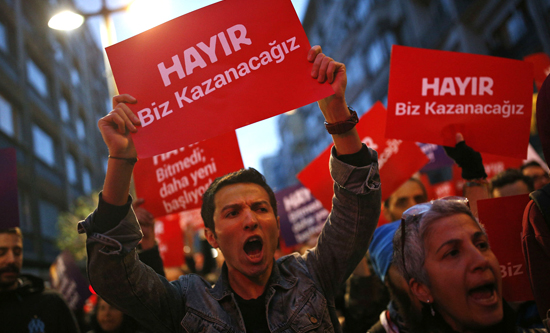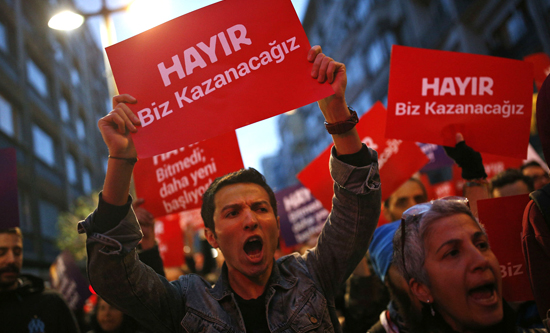
‘No’ voters have protested against the referendum result
That the opposition No vote gained almost half the votes cast in Turkey’s 16 April 2017 constitutional referendum, under conditions of fierce repression and blatant ballot rigging, should serve as a warning to President Erdogan and his Justice and Development Party (AKP). The Yes vote to grant Erdogan dictatorial powers was 51.4% and the No vote 48.6%. Erdogan lost in the big cities: Istanbul, Ankara, Izmir, Adana and Diyarbakir and in the Aegean and Mediterranean coastal regions and the predominantly Kurdish south east. The Financial Times commented: ‘The new constitution will turn the president into a modern-day sultan, allowing him ample opportunity to complete his subordination of Turkey’s institutions…This is a tragedy for the country. Mr Erdogan offers discord, not reform or development’ (18 April 2017). Erdogan threatens not only the Turkish and Kurdish people but the entire Middle East and he will be confronted and brought down.
The AKP was founded by Recep Tayyip Erdogan and Abdullah Gul in 2001. This is not an ordinary bourgeois party. It will not accept defeat at the polls and will not give up power unless it is toppled. The AKP won the 2002 parliamentary elections and has been in government ever since. During its rule, the military, the police and judiciary have been purged. Erdogan now commands a loyal police force, special operations forces and para-military organisations. The media, universities, schools, the civil service, civil society and business have all been attacked and are being forced to submit to Erdogan’s will.
Erdogan began his bid to concentrate and centralise powers in 2007 when he was Prime Minister. Previously, the president was elected by parliament (the Grand National Assembly). When a new president was due to be elected in 2007, the opposition People’s Republican Party (CHP) blocked the parliamentary election of Abdullah Gul as President of Turkey. The parliament was dissolved, in keeping with the constitution, but before doing so, it voted for a referendum to change the constitution so that the president would be elected by a popular vote, rather than by parliament. Parliamentary elections followed and resulted in the fascist National Movement Party (MHP) breaking the 10% threshold for parliamentary representation, gaining 71 MPs. The CHP boycott of Gul was thus rendered ineffective and Gul was elected president by parliament. This was before the referendum to change the constitution was held. The new president was in place before the referendum vote took place. The new parliament did not declare the law to change the constitution null and void, nor did President Gul stand down before the referendum. The referendum was held and voted ‘Yes’ to the constitutional changes. Gul remained president until Erdogan replaced him in 2014. Erdogan had seen that he could act against the constitution and get away with it, with little opposition; he had conducted a civil coup against the Turkish constitution.
During the 16 April referendum, the Supreme Electoral Council (SEC), responsible for overseeing and declaring the result, ruled that unstamped ballot papers were valid, even though the stamp is necessary for official verification. Consequently, thousands of polling stations recorded more votes than the number of voters registered in their districts. The CHP lodged objections at over 600 polling stations and demanded that the result be declared null and void. The predominantly Kurdish and left-wing People’s Democratic Party (HDP) appealed to the SEC to annul the referendum, pointing to the decision declaring unstamped ballot papers valid. International observers condemned the conduct of the vote, including the Organisation for Security and Cooperation in Europe which said there had been fraud. No appeals to the judiciary will succeed. Erdogan and the AKP have rigged the courts; three members of the SEC were removed before the referendum vote.
Prior to the referendum ballot the No rallies were banned for security reasons and No campaigners were attacked; over 200 attacks have been documented. Television allocated about 20 times as much coverage to the Yes campaign as to the No campaign. Since the failed coup attempt of 15 July 2016 145,000 people have been detained or arrested and 134,000 people sacked; accused of supporting the coup but actually for being suspected of opposing Erdogan and AKP. The Committee to Protect Journalists reported 259 journalists gaoled in Turkey on 1 December 2016; the highest number in any country in the world. 13 HDP MPs are in prison, including its co-chairs Selahattin Demirtas and Figen Yuksekdag. In the referendum campaign Erdogan said he wanted to bring back hanging in Turkey. Immediately after the result was announced, parliament extended the State of Emergency by a further three months, allowing Erdogan to rule by decree. He is bent on confrontation and he will get it.
Significantly, Istanbul voted No. Erdogan was mayor of the city from 1994 to 1998 and made his name there. The AKP has won every election in Istanbul since 2001. Ankara also voted No, after having elected AKP candidates in recent years. Even AKP strongholds voted No, with people condemning corruption and cronyism. Despite reports of widespread vote rigging and hundreds of thousands of people being disenfranchised by forcible removal from their homes, towns and cities that had been attacked by the Turkish state forces and placed under curfew, Kurdish areas voted 60-80% and more for No. Among Turkish citizens abroad the overall vote was Yes 59.05% and No 40.95%. In Britain the vote was 80% for No and 20% for Yes, while in Germany the vote was 63% Yes and 37% for No. Both with less than 47% of voter turnout.
The Turkish economy continues to deteriorate: the Turkish lira is the worst performing emerging market currency in 2017; inflation is up to 11%; overall unemployment is 13% and youth unemployment is 25%. Erdogan’s and the AKP government’s past electoral success were partly due to Turkey’s economic growth. That period has now ended. Division and conflict will follow.
Erdogan will treat the referendum vote as electoral support for escalating the war on the Kurds, wherever they are. 24 April marked the centenary of the start of Turkey’s genocide of the Armenian and Chaldean-Assyrian peoples, in which 1.5 million people were killed. On the night of the 24/25 April 2017, dozens of Turkish state fighter jets attacked Rojava and Shengal, home of the Yazidi people, in northern Iraq. 20 Kurdish guerrillas were killed, including 12 Women’s Defence Unit (YPJ) fighters. Turkey’s defence minister had said that Turkey would not allow the Syrian Democratic Forces, which includes the YPJ, to liberate Raqqa from the Islamic State (IS). Erdogan and the Turkish state are defending IS. He is lighting a fire that will consume him.
Whatever the demagogic ranting of Erdogan about his majority share of the popular vote in the referendum, the political power he holds is illegitimate and is seen as such by growing numbers of people. He has manipulated Turkey’s constitution and breached the legal limits even of the reactionary bourgeois order in Turkey. Against Erdogan and his illegitimate government, the people of Turkey have the historical right to resist and rise up by any means necessary.
Trevor Rayne




